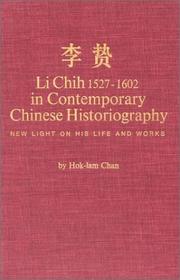| Listing 1 - 4 of 4 |
Sort by
|
Book
ISBN: 1438439288 9781438439280 9781438439273 143843927X 9781438439266 Year: 2012 Publisher: Albany : State University of New York Press,
Abstract | Keywords | Export | Availability | Bookmark
 Loading...
Loading...Choose an application
- Reference Manager
- EndNote
- RefWorks (Direct export to RefWorks)
Li Zhi (1527–1602) was a bestselling author with a devoted readership. His biting, shrewd, and visionary writings with titles like A Book to Hide and A Book to Burn were both inspiring and inflammatory. Widely read from his own time to the present, Li Zhi has long been acknowledged as an important figure in Chinese cultural history. While he is esteemed as a stinging social critic and an impassioned writer, Li Zhi's ideas have been dismissed as lacking a deeper or constructive vision. Pauline C. Lee convincingly shows us otherwise. Situating Li Zhi within the highly charged world of the late-Ming culture of "feelings," Lee presents his slippery and unruly yet clear and robust ethical vision. Li Zhi is a Confucian thinker whose consuming concern is a powerful interior world of abundance, distinctive to each individual: the realm of the emotions. Critical to his ideal of the good life is the ability to express one's feelings well. In the work's conclusion, Lee brings Li Zhi's insights into conversation with contemporary philosophical debates about the role of feelings, an ethics of authenticity, and the virtue of desire.
Desire (Philosophy) --- Confucian ethics. --- Philosophy --- Religious ethics --- Li, Zhi, --- Li, Chih, --- Li, Tschi, --- Ri, Shi, --- 李贽, --- 李贄, --- Li, Zhuowu, --- Li, Cho-wu, --- Li, Tscho-wu, --- Ri, Takugo, --- 李卓吾, --- Li, Wenling, --- Li, Wen-ling, --- Ri, Onryo, --- 李温陵, --- Ri, Kōshin, --- 李宏甫, --- Li, Hongfu, --- 温陵居, --- Wenlingjushi, --- Confucian ethics --- S12/0650 --- China: Philosophy and Classics--Zajia, eclectici (incl. Wang Chong, Lunheng, Li Zhi) --- Desire (Philosophy).
Book
ISBN: 9780295748375 0295748370 9780295748382 0295748389 0295748397 Year: 2020 Publisher: Seattle University of Washington Press
Abstract | Keywords | Export | Availability | Bookmark
 Loading...
Loading...Choose an application
- Reference Manager
- EndNote
- RefWorks (Direct export to RefWorks)
"The iconoclastic scholar Li Zhi (1527-1602) was a central figure in the cultural world of the late Ming dynasty. His provocative and controversial writings and actions powerfully shaped late-Ming print culture, commentarial and epistolary practice, discourses on authenticity and selfhood, attitudes toward friendship and masculinity, displays of filial piety, understandings of the public and private spheres, views toward women, and perspectives on Buddhism and the afterlife. In this volume, leading sinologists demonstrate the interrelatedness of seemingly discrete aspects of Li Zhi's thought and emphasize the far-reaching impact of his ideas and actions on both his contemporaries and his successors. In doing so, they challenge the myth that there was no tradition of dissidence in premodern China"--
Li, Zhi, --- Li, Chih, --- Li, Tschi, --- Ri, Shi, --- 李贽, --- 李贄, --- Li, Zhuowu, --- Li, Cho-wu, --- Li, Tscho-wu, --- Ri, Takugo, --- 李卓吾, --- Li, Wenling, --- Li, Wen-ling, --- Ri, Onryo, --- 李温陵, --- Ri, Kōshin, --- 李宏甫, --- Li, Hongfu, --- 温陵居, --- Wenlingjushi, --- S12/0650 --- China: Philosophy and Classics--Zajia, eclectici (incl. Wang Chong, Lunheng, Li Zhi) --- Asian history

ISBN: 087332160X Year: 1980 Publisher: New York Sharpe
Abstract | Keywords | Export | Availability | Bookmark
 Loading...
Loading...Choose an application
- Reference Manager
- EndNote
- RefWorks (Direct export to RefWorks)
Statesmen --- S05/0213 --- S04/0200 --- S04/0670 --- S12/0650 --- China: Biographies and memoirs--Ming --- China: History--Historiography and theory of history --- China: History--Ming: 1368 - 1644 --- China: Philosophy and Classics--Zajia, eclectici (incl. Wang Chong, Lunheng, Li Zhi) --- Li, Zhi, --- Li, Chih, --- Li, Tschi, --- Ri, Shi, --- 李贽, --- 李贄, --- Li, Zhuowu, --- Li, Cho-wu, --- Li, Tscho-wu, --- Ri, Takugo, --- 李卓吾, --- Li, Wenling, --- Li, Wen-ling, --- Ri, Onryo, --- 李温陵, --- Ri, Kōshin, --- 李宏甫, --- Li, Hongfu, --- 温陵居, --- Wenlingjushi,
Book
ISBN: 029574197X 9780295741970 9780295741505 0295741503 Year: 2017 Publisher: Seattle, [Washington] ; London, [England] : University of Washington Press,
Abstract | Keywords | Export | Availability | Bookmark
 Loading...
Loading...Choose an application
- Reference Manager
- EndNote
- RefWorks (Direct export to RefWorks)
Symptoms of an Unruly Age compares the writings of Li Zhi (1527-1602) and his late-Ming compatriots to texts composed by their European contemporaries, including Montaigne, Shakespeare, and Cervantes. Emphasizing aesthetic patterns that transcend national boundaries, Rivi Handler-Spitz explores these works as culturally distinct responses to similar social and economic tensions affecting early modern cultures on both ends of Eurasia. The paradoxes, ironies, and self-contradictions that pervade these works are symptomatic of the hypocrisy, social posturing, and counterfeiting that afflicted both Chinese and European societies at the turn of the seventeenth century.
Chinese literature --- History and criticism. --- Li, Zhi, --- Li, Chih, --- Li, Tschi, --- Ri, Shi, --- 李贽, --- 李贄, --- Li, Zhuowu, --- Li, Cho-wu, --- Li, Tscho-wu, --- Ri, Takugo, --- 李卓吾, --- Li, Wenling, --- Li, Wen-ling, --- Ri, Onryo, --- 李温陵, --- Ri, Kōshin, --- 李宏甫, --- Li, Hongfu, --- 温陵居, --- Wenlingjushi, --- Criticism and interpretation. --- S16/0700 --- History and criticism --- China: Literature and theatrical art--Comparative literature --- HISTORY / Asia / China --- Sociology --- Political science --- Culture --- Critical theory. --- Civilization, Modern --- SOCIAL SCIENCE --- Political philosophy --- Critical social theory --- Critical theory (Philosophy) --- Critical theory (Sociology) --- Negative philosophy --- Criticism (Philosophy) --- Philosophy, Modern --- Rationalism --- Frankfurt school of sociology --- Socialism --- Behavioral sciences --- Human sciences --- Sciences, Social --- Social science --- Social studies --- Civilization --- Philosophy. --- General. --- Regional Studies. --- Anthropology
| Listing 1 - 4 of 4 |
Sort by
|

 Search
Search Feedback
Feedback About UniCat
About UniCat  Help
Help News
News